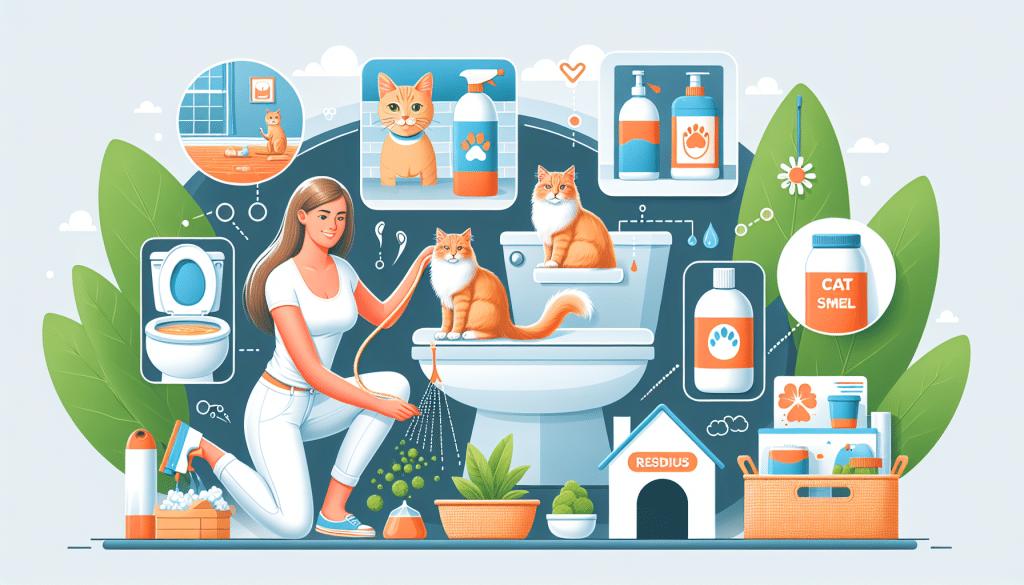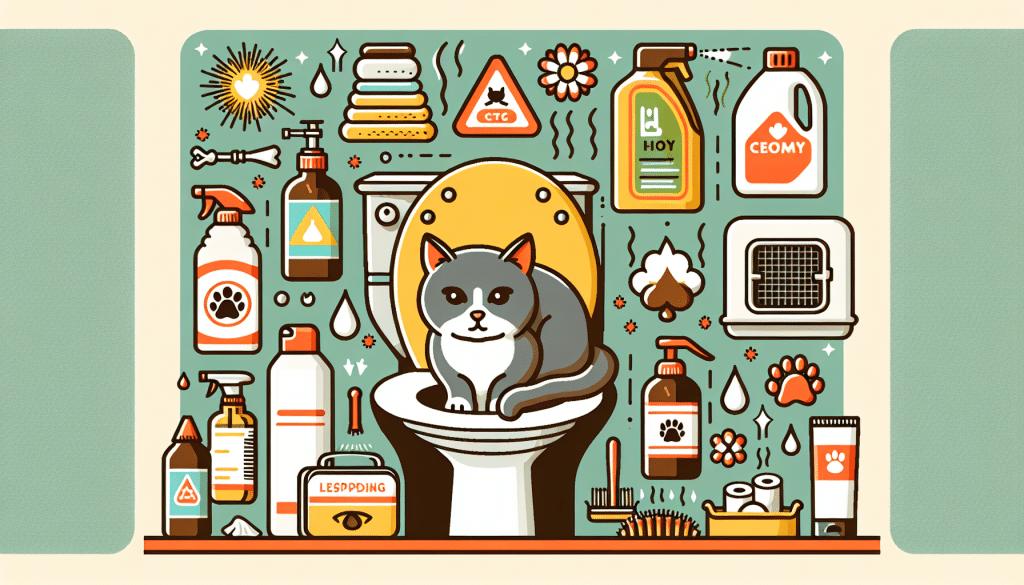So, you’ve found yourself in the unfortunate predicament of dealing with that unmistakable scent of cat urine in your home. We all love our furry friends, but let’s face it, their urine can leave a lasting unpleasant odor. But fear not, because in this article, you’ll discover some effective tips and tricks on how to eliminate that stubborn cat urine smell from your home. Whether it’s on carpets, furniture, or even your hardwood floors, we’ve got you covered with practical solutions that will have your home smelling fresh and clean again in no time.

Understanding the Stubbornness of Cat Urine Smell
Cat urine smell can be incredibly persistent and challenging to eliminate. Whether your cat has had an accident outside the litter box or you’ve recently moved into a home with previous cat occupants, the distinctive odor can linger for a long time if not properly addressed. Understanding why cat urine smell is so stubborn is the first step in effectively eliminating it.
Why cat urine smell is hard to eliminate
The unique composition of cat urine is one of the main reasons why its smell is so difficult to eliminate. Cat urine contains several compounds, such as uric acid, that contribute to its strong and persistent odor. Unlike other types of urine, cat urine contains high levels of uric acid, which can crystallize and bind to fabrics, surfaces, and even penetrate deep into porous materials like carpet and wood.
These uric acid crystals release an ammonia-like smell when they come into contact with moisture or humidity, making the odor linger even after the liquid itself has dried. Additionally, the presence of bacteria in the urine further exacerbates the odor, as they break down the urea in the urine and release foul-smelling compounds.
The compounds in cat urine responsible for the smell
Cat urine contains various compounds that are responsible for its distinct smell. The primary culprit is uric acid, which breaks down into two components: urea and ammonia. Urea is odorless, but when it comes in contact with bacteria, it decomposes into ammonia, which releases a pungent odor.
Apart from uric acid, cat urine also contains other compounds like creatinine and various organic acids, which can contribute to the overall odor. These compounds can be particularly stubborn and require specific cleaning methods to effectively eliminate the smell.
Preventing Cat Urine Smell
Preventing cat urine smell in the first place is always better than having to deal with removing it later. By taking some preventive measures, you can significantly reduce the chances of encountering lingering cat urine odors in your home.
Importance of litter box hygiene
Maintaining proper litter box hygiene is crucial in preventing cat urine smells. Make sure to scoop the litter box daily, removing any clumps or soiled litter. Regularly replacing the litter entirely and thoroughly cleaning the box with cat-safe disinfectants will help deter your cat from urinating outside the litter box and minimize any residual smells.
Training cats to use the litter box
Properly training your cat to use the litter box can go a long way in preventing accidents and subsequent urine smells. Start by placing your cat in the litter box after meals or naps, as they are more likely to need to eliminate during these times. Gradually reduce the frequency of these promptings as your cat becomes more comfortable with using the litter box independently.
Additionally, ensure that the litter box is easily accessible, in a quiet location, and appropriately sized for your cat. Some cats have preferences for certain types of litter, so experiment with different options to find one that your cat prefers.
Changing the cat’s diet
Believe it or not, a cat’s diet can directly impact the smell and concentration of their urine. Certain foods can lead to stronger-smelling urine, making it more challenging to eliminate the odor. Consult with your veterinarian to ensure your cat’s diet is well-balanced and appropriate for their age and health condition.
By providing a healthy diet, you can help regulate your cat’s urine odor, making it easier to manage any accidents and keep your home smelling fresh.

Immediate Steps After Your Cat Urinates Outside the Litter Box
Accidents happen, and sometimes your cat might urinate outside of the litter box. It’s crucial to take immediate action to prevent the urine from seeping into surfaces and leaving a long-lasting smell.
Blotting the area with paper towel
If you discover fresh cat urine outside the litter box, act quickly by blotting the area with paper towels or absorbent cloths. Gently press down on the spot to absorb as much urine as possible. Avoid rubbing or scrubbing the area, as this may spread the urine and embed it deeper into the surface.
Preventing the cat from returning to the area
To prevent your cat from revisiting the same spot and urinating there again, block off access to the area temporarily. Use baby gates or furniture barriers to restrict your cat’s access until the smell is eliminated and the area is thoroughly cleaned.
Applying water and soap to the area
After blotting the area, thoroughly clean it with a mixture of water and mild soap. Scrub the surface gently, ensuring the soap reaches deep into fabrics or carpet fibers. Rinse the area with clean water to remove any residual soap or urine remnants. Avoid using ammonia-based cleaners, as they may intensify the smell by mimicking the scent of cat urine.
Commercial Cleaning Products for Removing Cat Urine Smell
Commercial cleaning products specially formulated to tackle cat urine smell can be effective in eliminating the odor. These products often contain enzymes that break down the compounds in cat urine, eliminating the source of the smell.
Top enzyme cleaners in the market
When it comes to enzyme cleaners, there are several reputable options available on the market. Some of the top-rated enzyme cleaners known for effectively removing cat urine smell include Nature’s Miracle Advanced Stain and Odor Eliminator, Rocco & Roxie Professional Strength Stain & Odor Eliminator, and Angry Orange Pet Odor Eliminator.
How enzyme cleaners work
Enzyme cleaners work by introducing specific enzymes that break down the uric acid crystals and other compounds found in cat urine. These enzymes break down the odor-causing molecules, effectively eliminating the source of the smell rather than simply masking it. Enzyme cleaners are usually applied directly to the affected area and left to air dry.
How to properly apply enzyme cleaners
To ensure the best results when using enzyme cleaners, follow the specific instructions provided by the product manufacturer. Start by blotting the soiled area to remove excess urine, then thoroughly saturate it with the enzyme cleaner. Allow the cleaner to sit and work its magic for the recommended amount of time, usually around 10-15 minutes. Afterward, blot the area again and allow it to air dry completely.

Natural Remedies for Removing Cat Urine Smell
If you prefer using natural remedies or do not have access to commercial cleaning products, there are several household items that can help eliminate cat urine smell.
Using vinegar solution
A vinegar solution can be an effective natural remedy for removing cat urine smell. Mix equal parts of white vinegar and water, then generously apply the solution to the affected area. Allow it to sit for a few minutes before blotting it up with paper towels or a clean cloth. Repeat this process as needed until the smell is eliminated.
Using baking soda
Baking soda is known for its odor-absorbing properties and can be used to neutralize cat urine smell. After blotting up any excess urine, generously sprinkle baking soda over the affected area. Gently work the baking soda into the fabric or carpet using a soft brush or your fingers. Let it sit for a few hours or overnight, then vacuum it up. Baking soda can also be used in conjunction with other cleaning methods for enhanced odor removal.
The efficacy of hydrogen peroxide
Hydrogen peroxide can be effective in removing cat urine smell, particularly on light-colored surfaces or fabrics. However, it’s essential to use it with caution to avoid discoloration or damage. Test a small, inconspicuous area first to ensure there is no adverse reaction. If the area is suitable for treatment, apply hydrogen peroxide directly to the affected area, let it sit for a few minutes, then blot and rinse thoroughly.
The role of dish detergent
Dish detergent can help break down the greasy components of cat urine and assist in removing the smell. After blotting up the urine, mix a solution of warm water and a few drops of dish detergent. Apply the solution to the affected area, gently scrubbing with a cloth or sponge. Rinse thoroughly with clean water and blot with paper towels. Dish detergent can be used in combination with other natural remedies for optimal results.
Dealing with Cat Urine Smell on Specific Items
Cat urine smell can permeate various items in your home, such as clothes, carpets, furniture, and hardwood floors. Here are some specific methods to remove the odor from these items:
Removing cat urine smell from clothes
If your cat has urinated on clothing, immediate action is crucial. Rinse the soiled clothing under cold water to flush out as much urine as possible. Afterward, pretreat the stained area with a mixture of water and enzyme-based laundry detergent. Allow the garment to soak for at least 30 minutes before laundering it as usual. For stubborn odors, consider adding a half-cup of vinegar or baking soda to the wash cycle.
Effective methods to remove cat urine smell from carpets
To remove cat urine smell from carpets, start by blotting up any excess urine with paper towels. Follow this with a thorough cleaning using a mixture of water, vinegar, and enzyme cleaner. Spray the solution onto the affected area and let it sit for a few minutes before blotting it dry. For deep-set odors, you may need to use a carpet cleaner or hire professional carpet cleaning services.
Get rid of cat urine smell on furniture
When dealing with cat urine on furniture, begin by blotting up any wet urine using paper towels or cloth. Next, spray a mixture of water and vinegar onto the affected area, followed by an enzyme cleaner. Gently scrub the area using a brush or cloth, then blot dry. If the furniture has removable covers, wash them according to the manufacturer’s instructions.
Eliminating cat urine smell from hardwood floors
To remove cat urine smell from hardwood floors, blot up any liquid immediately using paper towels or a sponge. Clean the affected area with a mixture of warm water and a mild, pH-neutral wood cleaner. Be sure to follow the manufacturer’s instructions and avoid using excessive moisture. For stubborn smells, lightly sand the area, then reseal with an appropriate wood sealant.
Understanding and Dealing with Old Cat Urine Stains
Old cat urine stains can pose an even greater challenge to remove than fresh ones. The longer the urine remains on surfaces, the more difficult it becomes to eliminate the odor completely.
How to find old cat urine stains
Old cat urine stains are not always visible to the naked eye, especially on absorbent surfaces. To locate hidden stains, you can use a blacklight or UV flashlight, which causes the urine to fluoresce and become more apparent. Move the light around the area to identify any spots that may require additional cleaning.
Why old cat urine stains are difficult to clean
Old cat urine stains are challenging to clean because they have had more time to penetrate surfaces and create stubborn uric acid crystals. These crystals are resistant to many cleaning methods and may require more intensive treatments to break them down completely.
Best approaches for removing old cat urine stains
When dealing with old cat urine stains, a combination of multiple cleaning methods may be necessary. Begin by thoroughly cleaning the affected area with an enzyme cleaner, allowing it to sit for an extended period to ensure thorough penetration. Repeat the cleaning process as needed, and consider using a blacklight to verify the complete removal of the stain.
The Role of Professional Cleaning Services
In some cases, professional cleaning services may be necessary to effectively eliminate cat urine smell, especially if the odor persists despite your best efforts.
When to consider professional cleaning services
If you have exhausted all home remedies and cleaning methods without success, or if the cat urine smell is exceptionally severe or widespread, it may be time to call in the professionals. They have specialized equipment, expertise, and commercial-grade products that can effectively tackle lingering cat urine odors.
The cost of professional cleaning services
The cost of professional cleaning services for cat urine odor removal can vary depending on factors such as the size of the affected area, the severity of the odor, and the location of your home. It is best to contact several reputable cleaning companies and request estimates for their services. Remember that the investment in professional cleaning can save you time, effort, and potential health risks associated with persistent cat urine smells.
What professional cleaning services do in eliminating cat urine smell
Professional cleaning services employ various techniques to eliminate cat urine smells, including deep cleaning, deodorizing treatments, and specialized equipment such as ozone generators and steam cleaners. They assess the specific situation, determine the best course of action, and provide tailored solutions to effectively remove the odor.
Health Risks of Lingering Cat Urine Smell
Lingering cat urine smell poses not only olfactory discomfort but also health risks that should not be overlooked. Understanding these risks is essential when dealing with cat urine odors.
Physical health risks
Prolonged exposure to cat urine smell can lead to physical health issues. Ammonia and other volatile organic compounds released from cat urine can irritate the respiratory system, causing symptoms such as coughing, wheezing, and shortness of breath. Those with respiratory conditions like asthma may experience exacerbated symptoms in the presence of lingering cat urine odors.
Mental health risks
Living in an environment with persistent foul odors can also have adverse effects on mental health. The unpleasant smell can cause stress, anxiety, and overall discomfort, impacting mood and well-being. Additionally, the frustration of unsuccessfully removing the odor can add to feelings of helplessness and frustration.
Risks to other pets
Lingering cat urine smells can affect other pets in your household as well. The presence of strong urine odors may contribute to increased stress levels in other animals, leading to behavioral changes and possible house soiling. It’s important to address cat urine smells promptly to maintain a harmonious environment for all household pets.
Preventing Future Cat Urine Smells
Preventing future cat urine smells is essential for maintaining a fresh and odor-free home environment. By implementing a few preventive measures, you can minimize the chances of encountering lingering cat urine odors.
Re-training your cat
If your cat has developed a habit of urinating outside the litter box, re-training may be necessary. Observe your cat’s behavior and identify any triggers or stressors that could be contributing to the inappropriate elimination. Provide positive reinforcement and rewards when your cat successfully uses the litter box, and seek guidance from a veterinarian or animal behaviorist if needed.
Choosing the right litter
Paying attention to the type of litter you use can make a significant difference in preventing cat urine smells. Some cats have preferences for certain textures or scents, so try out different options to find one that suits your cat’s preferences. Additionally, opt for clumping litter or litter with odor-neutralizing properties, as these can help contain the smell and make cleanup more manageable.
Regularly cleaning your home
Maintaining a clean and hygienic home is crucial in preventing cat urine smells. Regularly clean the litter box, scooping out clumps and refreshing the litter as needed. Vacuum carpets and upholstery regularly to remove any embedded hair or debris that could contribute to odor retention. By staying on top of regular cleaning tasks, you can prevent odor buildup and maintain a fresh-smelling home.
Monitoring your cat’s health
Monitoring your cat’s overall health and promptly addressing any medical issues can help prevent future urine smells. Certain medical conditions, such as urinary tract infections or kidney problems, may cause changes in urination habits or urine odor. Regular veterinary check-ups and proactive care can help identify and treat these conditions, reducing the likelihood of urine-related odor issues.
In summary, understanding the stubbornness of cat urine smell is crucial in effectively eliminating it from your home. By taking preventive measures, immediately addressing accidents, using the right cleaning products, considering natural remedies, and, if necessary, seeking professional cleaning services, you can successfully combat cat urine smells. Additionally, being aware of the health risks associated with lingering odors highlights the importance of prevention and prompt action. With the right strategies in place, you can maintain a fresh, odor-free environment for both you and your feline companion.



